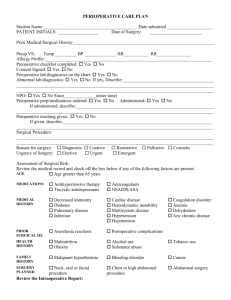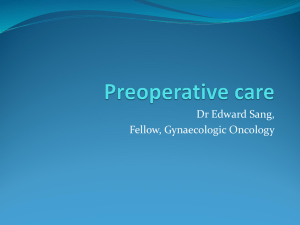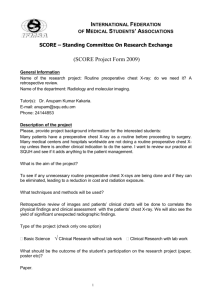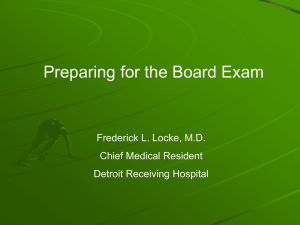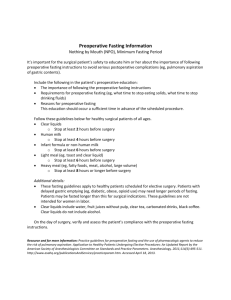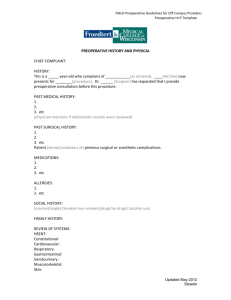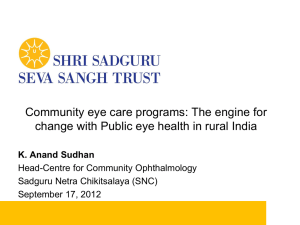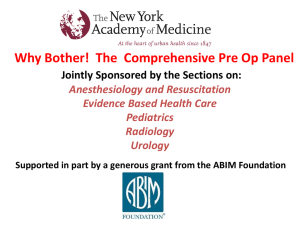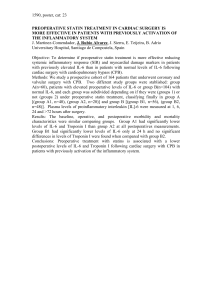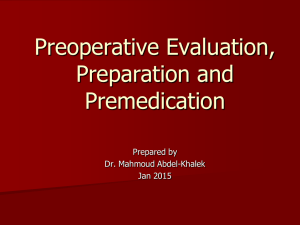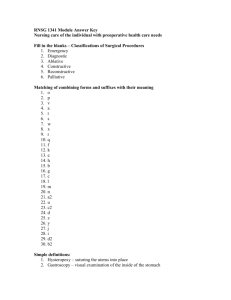Perioperative Testing
advertisement
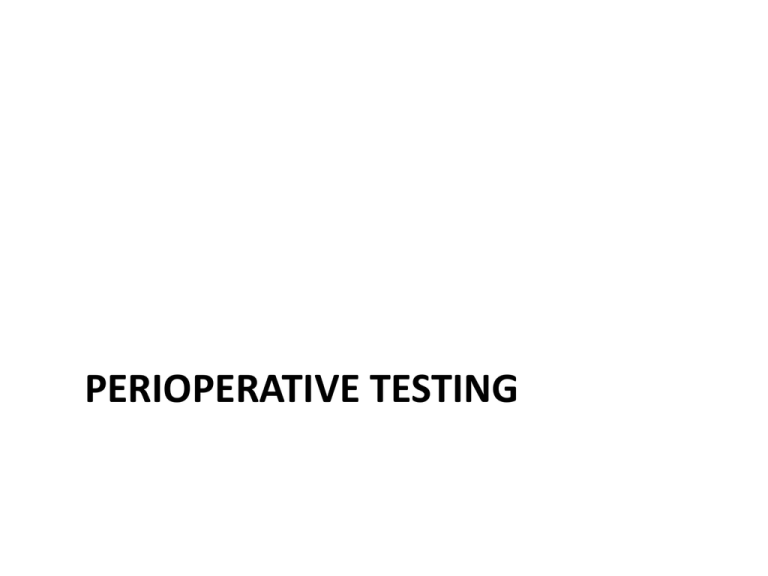
PERIOPERATIVE TESTING Question 1 • A 54 year old man is scheduled for elective inguinal hernia repair in 2 weeks. He has a PMH of well controlled hypertension on amlodipine. No previous surgeries. He is able to do 4 METS of activity without chest pain or dyspnea. His vital signs and physical exam is normal today. • • • • • • Which of the following are indicated prior to his surgery? PT/PTT Chest Xray CBC PT/PTT and CXR None of the above • Don’t obtain preoperative chest radiography in the absence of a clinical suspicion for intrathoracic pathology. • Avoid admission or preoperative chest x-rays for ambulatory patients with unremarkable history and physical exam. • Only 1% to 3% show a clinically significant abnormality, however, of which only approximately 0.1% affect clinical care. (MKSAP 16) • Avoid routine preoperative testing for low risk surgeries without a clinical indication. • Findings influence management in under 3% of patients tested. • In almost all cases, no adverse outcomes are observed when clinically stable patients undergo elective surgery, irrespective of whether an abnormal test is identified. Question 2 • MKSAP 16 question 125 • Don’t perform preoperative medical tests for eye surgery unless there are specific medical indications. • Low risk surgeries that don’t require cardiac screening Endoscopic surgery Cataract surgery Superficial surgery Breast surgery Ambulatory surgery Question 3 • MKSAP 16 question 47 • The only therapy proved effective for reducing the risk of postoperative pulmonary complications in the immediate perioperative period is pre- and postoperative lung volume expansion. • Results of pulmonary function testing do not predict the risk of pulmonary complications, and these tests have no role in routine preoperative evaluation. MKSAP 16 Question 4 • MKSAP 16 question 149 4. A 70-year-old man is evaluated preoperatively before elective total hip arthroplasty. He is able to ambulate on a level surface slowly but is unable to carry laundry or groceries up stairs because of his hip pain. He has had no recent chest pain or pressure. He has no orthopnea. Other than his hip pain, he feels well. He has hypertension and hyperlipidemia. Current medications are metoprolol, losartan, and simvastatin. BP is 132/78, HR 64, and RR 14/min. PE is normal. Serum creatinine level is 1.3 mg/dL. An electrocardiogram shows sinus rhythm with no ST- or Twave abnormalities. Which of the following is the most appropriate diagnostic test to perform next? A. B. C. D. Cardiac Cath CT coronary angiography Dobutamine Stress Echo No further testing needed Patients who have no cardiac history and good functional status do not require preoperative stress testing prior to noncardiac thoracic surgery. MKSAP 16 (1) history of heart disease, (2) history of compensated or prior heart failure, (3) history of cerebrovascular disease, (4) kidney insufficiency, (5) diabetes mellitus. Perioperative Medicine • Preoperative imaging and laboratory tests should be ordered only when an abnormal result is suspected on the basis of known or suspected comorbidities and when such a result would alter management. • For example, – UPT in young women – Cervical spine radiographs in rheumatoid arthritis – Creatinine in chronic kidney disease – Potassium level in patients taking diuretics. – In each case, the test is performed to evaluate for evidence of a condition that can have a silent presentation or assess an important physiologic variable likely to be abnormal. MKSAP 16
